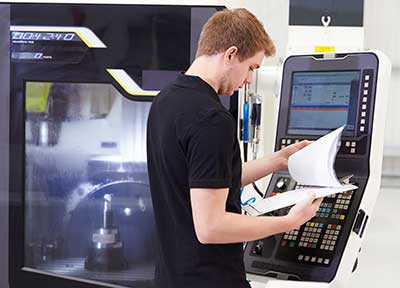Canada’s manufacturing sector is witnessing steady growth, with CNC (Computer Numerical Control) machine operators playing a crucial role in industries ranging from automotive to aerospace. This article will delve into the roles and responsibilities of CNC machine operators, essential skills for success, salary expectations, and how to advance in this field within Canada.
What is a CNC Machine Operator?
A CNC machine operator is a skilled professional responsible for operating, programming, and maintaining CNC machines. These machines are used to precisely cut, shape, and finish metal and plastic components essential in various manufacturing processes. The operators follow blueprints, input machine instructions, and oversee the production process to ensure high-quality output.
Roles and Responsibilities of CNC Machine Operators
- Operating CNC Machines: CNC operators run machines that cut and shape materials based on programmed instructions. They set up machines, select appropriate tools, and feed in raw materials. During the operation, they monitor the process, making adjustments as needed.
- Quality Control: After production, CNC operators perform quality checks, ensuring each piece meets precise specifications. They use measurement tools to verify dimensions and document any issues, maintaining a record of production quality.
- Maintenance and Troubleshooting: CNC operators conduct routine maintenance, checking for worn-out parts, lubricating moving components, and ensuring the machine is in optimal condition. They also troubleshoot minor issues, which helps prevent costly production delays.
Essential Skills for CNC Machine Operators in Canada
- Technical Aptitude: CNC machine operators need to understand machine programming languages and technical blueprints.
- Attention to Detail: Precision is key in CNC operations; even small errors can lead to costly mistakes.
- Problem-Solving Abilities: Operators often encounter unexpected issues with machine functionality or product specifications, requiring quick and effective solutions.
- Physical Stamina: The role often requires standing for long periods and handling heavy materials.
- Communication Skills: CNC operators need to communicate effectively with engineers, quality control inspectors, and other team members to ensure smooth production processes.
How to Become a CNC Machine Operator in Canada
Educational Requirements
In Canada, aspiring CNC machine operators typically need a high school diploma, along with specialized training in CNC programming. Many technical colleges offer CNC machine operator courses, which cover topics like machine operation, blueprint reading, and safety protocols.
Certifications and Training
While formal certifications are not always mandatory, they can boost employability. Many Canadian institutions offer CNC machining certifications, and some employers provide on-the-job training. Obtaining certification through a recognized program can make candidates more competitive in the job market.
Career Advancement Opportunities for CNC Machine Operators
Starting as a junior CNC operator provides a foundation in basic machine operations. With experience and additional certifications, operators can advance to roles like CNC programmer, setup operator, or even a supervisory position. Employers often favor candidates who continuously update their skills through certifications and professional development.
CNC Machine Operator Salary in Canada
The average salary for CNC machine operators in Canada is around CAD $43,520 per year. Entry-level positions start at approximately CAD $37,086, while experienced operators with specialized skills can earn up to CAD $58,500 annually. Salary varies based on industry, company size, and the operator’s level of expertise.
Job Outlook for CNC Machine Operators in Canada
The demand for CNC machine operators is expected to grow as Canada’s manufacturing sector expands. Skilled CNC operators are essential in industries such as aerospace, automotive, and healthcare, with a steady demand for precision-machined components. Additionally, with advancements in CNC technology, operators with programming skills are highly sought after.
Key Advantages of Working as a CNC Machine Operator in Canada
- Job Stability: CNC machining is an integral part of the manufacturing process, offering stability in the job market.
- Competitive Salary: With experience, CNC operators can earn a lucrative salary.
- Growth Opportunities: Opportunities for advancement exist within various industries, including engineering and quality control.
- Diverse Work Settings: CNC operators can work in a range of industries, from automotive to electronics manufacturing, providing a variety of career paths.
Emerging Trends in CNC Machining in Canada
- Automation Integration: Canadian manufacturing is increasingly embracing automation, with CNC machines now capable of running independently for longer periods. This reduces the demand for manual tasks and increases efficiency.
- Additive Manufacturing: CNC technology is merging with 3D printing, enabling faster production of complex parts. Operators with knowledge of both CNC machining and additive manufacturing have a competitive advantage.
- Eco-Friendly Manufacturing Practices: The industry is shifting towards sustainable manufacturing practices, including the use of recyclable materials and energy-efficient machines.
Getting Started as a CNC Machine Operator in Canada
Job Search Tips
- Networking: Join CNC or manufacturing industry groups on LinkedIn and attend trade shows to meet potential employers.
- Job Boards: Sites like Indeed and Randstad frequently post openings for CNC machine operators across Canada.
- Resume Building: Highlight technical skills, experience with specific machines, and any certifications you have obtained.
Future Skills Needed for CNC Machine Operators in Canada
The role of CNC machine operators is evolving alongside advancements in technology. Canadian manufacturers are increasingly looking for CNC operators with additional skills beyond machine operation. Here are some of the future skills that are expected to be in high demand:
- Data Analysis: CNC machines generate a wealth of data during operations. Understanding and analyzing this data helps operators optimize machine performance, predict maintenance needs, and ensure quality control. Operators who can leverage data analytics will be invaluable to companies adopting Industry 4.0 technologies.
- Advanced CNC Programming: Knowledge of advanced programming techniques, such as G-code, M-code, and parametric programming, is becoming essential as companies adopt more complex CNC machinery. Operators with programming expertise can take on roles such as CNC programmer or CNC setup technician, both of which offer increased responsibilities and salaries.
- Digital Skills for Smart Manufacturing: The shift towards smart manufacturing and Internet of Things (IoT) integration in Canada means CNC operators will benefit from familiarity with digital interfaces, IoT-enabled devices, and remote monitoring technologies. Understanding how to work with these tools can help operators troubleshoot issues remotely, improving efficiency and reducing downtime.
- Soft Skills: Communication, problem-solving, and teamwork are increasingly valued in the Canadian manufacturing sector. CNC operators frequently collaborate with other production staff, engineers, and quality assurance teams. Developing strong communication skills can lead to supervisory roles where operators manage teams, train new hires, and oversee production processes.
Safety Practices for CNC Machine Operators in Canada
CNC machine operators in Canada are subject to strict health and safety regulations, overseen by organizations like WorkSafeBC and the Canadian Centre for Occupational Health and Safety (CCOHS). Here are key safety practices and regulations for Canadian CNC operators:
- Personal Protective Equipment (PPE): CNC operators must wear PPE such as safety glasses, gloves, and steel-toed boots to protect against flying debris, sharp edges, and heavy machinery. Proper attire can prevent injuries associated with handling metal parts and operating heavy-duty machinery.
- Regular Machine Maintenance Checks: Operators are trained to perform regular maintenance checks to identify worn-out parts and potential hazards. Routine checks ensure the machinery operates efficiently and safely. For instance, identifying a misaligned part or worn blade early on can prevent machine failure and potential workplace accidents.
- Safe Material Handling: CNC operators often work with metal, plastic, and composite materials, which can be hazardous if not handled properly. Many Canadian companies follow material handling protocols that include proper lifting techniques and ergonomic adjustments to reduce strain injuries.
- Emergency Preparedness Training: Employers in Canada are required to provide CNC operators with emergency training. Operators must know how to quickly power down a machine and perform basic first aid in case of an accident. Many Canadian manufacturing facilities regularly conduct emergency drills to keep employees prepared for potential incidents.
Career Advancement Tips for CNC Operators in Canada
A career as a CNC operator can lead to many opportunities for growth in Canada’s diverse manufacturing sector. Here are some tips for CNC operators aiming to advance their careers:
- Specialize in a Specific Industry: Industries such as aerospace, automotive, and medical device manufacturing offer specialized CNC operator roles. By gaining experience in one of these fields, operators can command higher salaries and become experts in niche areas. Specialization also opens doors to roles that may involve precision machining and specialized materials.
- Pursue Further Education and Certifications: In addition to certifications, many Canadian CNC operators further their education by completing diplomas in mechanical engineering or manufacturing technology. These additional qualifications can lead to roles such as quality assurance technician, CNC programmer, or even production manager. Many trade schools in Canada, such as George Brown College and NAIT, offer advanced CNC and manufacturing technology courses.
- Build a Network within the Manufacturing Community: Networking through organizations like the Canadian Manufacturers & Exporters (CME) or attending trade shows such as the Canadian Manufacturing Technology Show can connect operators with industry professionals and potential employers. Networking can provide insight into trends, job openings, and skill requirements, helping operators stay ahead of the curve.
- Embrace New Technologies: Embracing technologies like 3D printing and automation can make CNC operators more versatile. As industries integrate CNC with robotics, operators with knowledge of robotics and automation are positioned to take on advanced roles. For example, some Canadian CNC operators now work alongside robotic arms, handling complex tasks such as automated loading and unloading of parts.
Job Satisfaction and Work-Life Balance for CNC Operators in Canada
While CNC operators often work in fast-paced environments, they generally report high levels of job satisfaction. Here are a few factors contributing to a positive work experience:
- Variety in Daily Tasks: The nature of CNC work requires operators to switch between programming, machine setup, and quality checks. This variety helps keep the job engaging and allows operators to continuously learn and develop new skills.
- Opportunities for Shift Work: Many manufacturing companies in Canada offer flexible shift options, allowing operators to choose shifts that align with their personal schedules. This flexibility can contribute to a better work-life balance, especially for those with family or other commitments.
- Hands-On Work: CNC operators enjoy the hands-on nature of their work, as it combines technical skills with tangible results. Many operators take pride in producing high-quality parts that are essential to larger projects, such as building aircraft or medical devices.
In conclusion, CNC machine operators in Canada have numerous pathways to success. The role offers stability, growth opportunities, and a chance to work at the forefront of technology in the manufacturing sector. By staying updated on industry trends, advancing technical skills, and adhering to safety practices, CNC operators can build a rewarding career and contribute significantly to Canada’s industrial landscape.









